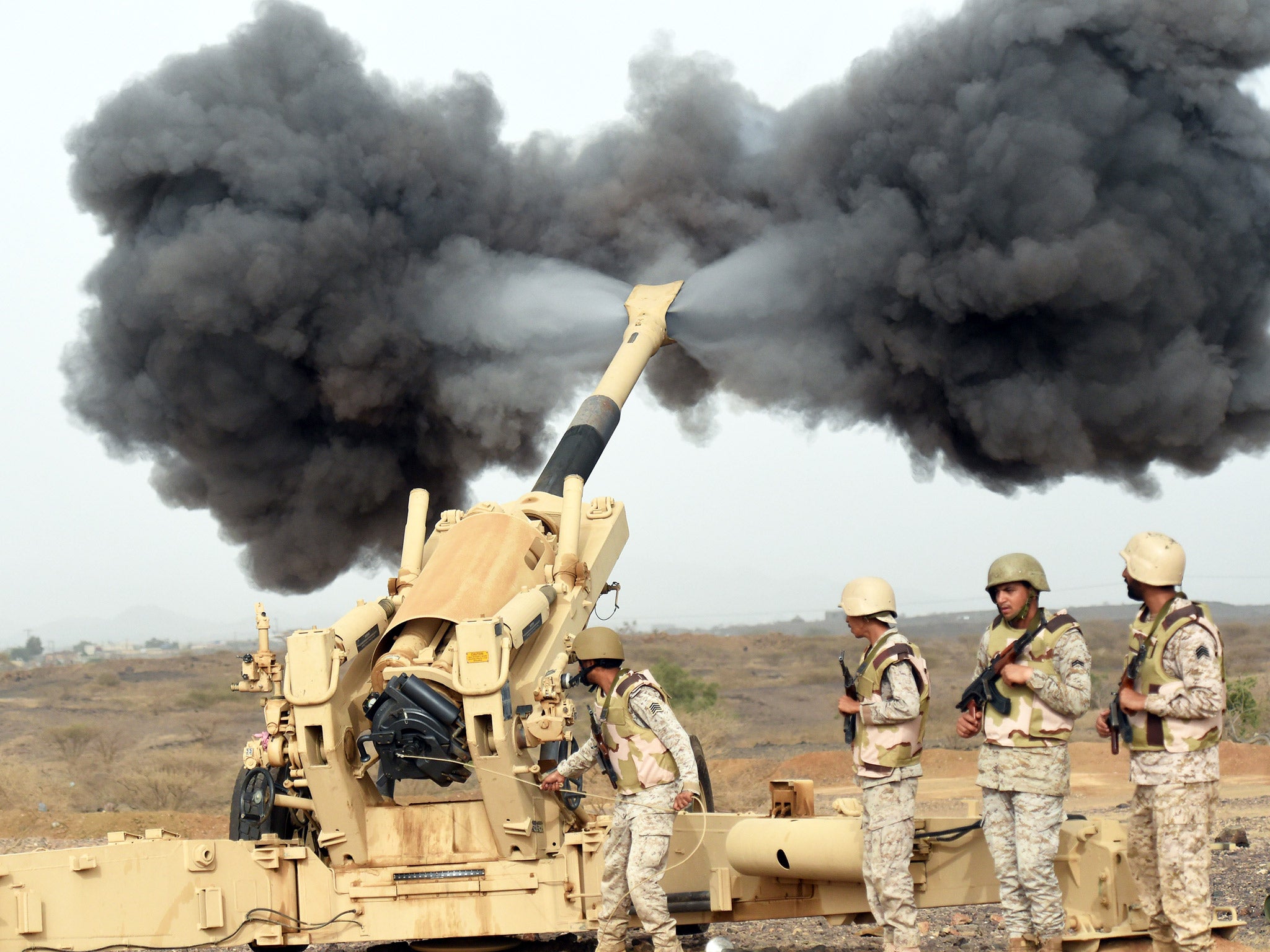Is the Government providing cover for our arms sales to Saudi Arabia?
The Saudi intervention in Yemen’s civil war must prompt us to ask ourselves searching questions about our arms industry


Your support helps us to tell the story
From reproductive rights to climate change to Big Tech, The Independent is on the ground when the story is developing. Whether it's investigating the financials of Elon Musk's pro-Trump PAC or producing our latest documentary, 'The A Word', which shines a light on the American women fighting for reproductive rights, we know how important it is to parse out the facts from the messaging.
At such a critical moment in US history, we need reporters on the ground. Your donation allows us to keep sending journalists to speak to both sides of the story.
The Independent is trusted by Americans across the entire political spectrum. And unlike many other quality news outlets, we choose not to lock Americans out of our reporting and analysis with paywalls. We believe quality journalism should be available to everyone, paid for by those who can afford it.
Your support makes all the difference.The news from the UN last week that Saudi Arabia has been indiscriminately targeting Yemini civilians and that 60 per cent of the population (14.4 million people) are going hungry, marks only the latest milestone to be roundly ignored by the British government since Saudi Arabia intervened in Yemen’s civil war in March last year.
As these grim milestones are passed, British-made bombs rain down from British-made planes on a terrified and starving population.
In testimony bordering on the absurd, Desmond Swayne, minister for the Department of International Development, pointedly rejected the position of Save the Children, UNICEF, Oxfam and Saferworld: that British arms sales to Saudi Arabia – £3 billion in the first six months of the war alone –undermine the UK’s development efforts in Yemen.
“There is no evidence that I have that that is the case,” he said. “I reject it.”
Mr Swayne’s faith that Britain’s £100m of aid projects in Yemen can withstand several billion pounds of its own ordnance is to be applauded.
Mr Swayne is not the only minister scrambling to defend the indefensible. Last month, Secretary of State for the Foreign Office Philip Hammond, responded to a question by his Labour counterpart Hilary Benn on whether British troops on the ground monitoring the bombing campaign had reported “potential breaches of international humanitarian law”. Mr Hammond said that the troops had not reported any “deliberate” war crimes, implying reports of accidental war crimes had been passed to him.
Mr Hammond is clearly unaware of the fact that Saudi Arabia’s lack of intent to bomb civilian populations does not get him around our own arms export laws, which state that we cannot sell arms to states who pose a “clear risk” of breaking international humanitarian law. Even worse, in an answer to my parliamentary question, Mr Hammond’s deputy Mr Tobias Ellwood demonstrated he believes that that Saudi Arabia is not at risk of breaking international humanitarian law. Perhaps he has not read the UN’s report, which said Saudi Arabia’s coalition had done just that – 119 times.
The Saudi intervention in Yemen’s civil war must prompt us to ask ourselves searching questions about our arms industry.
Namely, should the government be promoting, subsidising and providing political cover for the arms industry?
Through the UK Trade and Investment Defence & Security Organisation (UTI-DSO), part of the Department for Business, Innovation and Skills, we pay 160 civil servants to promote British arms across the world. Since 2012, companies have also received assistance from the MoD's Defence Export Support Group. Last November's Strategic Defence and Security Review promised extra support for arms exports. The promotion of arms is also on the agenda of much of the diplomatic outreach work undertaken by the Foreign Office and the Ministry of Defence.
In 2011, the Stockholm International Peace Research Institute found that £699m was spent on UK arms subsidies in 2011,through both the DSO and grants to university departments that train weapons engineers. When Labour councils last year backed policies to boycott UK arms sales to Israel, the conservative government proposed laws banning such divestment. Conservative Communities Minister Greg Clarkeven equated such grass roots activism to an apartheid state, adding that it would cost British jobs and “poison”community relations.
Transparency International has calculated that 40 per cent global corruption occurred in the arms trade. Despite David Cameron’s pledge to “break the taboo on talking about corruption”, when British alleged corruption is investigated, the government steps in, quashing investigations to save blushes in both London and Riyadh.
We must also acknowledge that Britain sells arms to several other dubious regimes including Bahrain, Egypt, Sri Lanka and Saudi Arabia. In doing so, we must tighten up our arms export licences and end-user certificates.
The government routinely claims that Britain has “one of the most robust arms export control regimes in the world” but this has been shown to be manifestly untrue. If the UN, rights groups and the international media are reporting of Saudi Arabian war crimes in Yemen, why has the UK denied only eight out of well over 100 Saudi requests for UK arms? The answer is sadly clear for all: we are making a killing.
Join our commenting forum
Join thought-provoking conversations, follow other Independent readers and see their replies
Comments